Jimmy Carter: Nobel-winning humanitarian and ex-US president dies aged 100
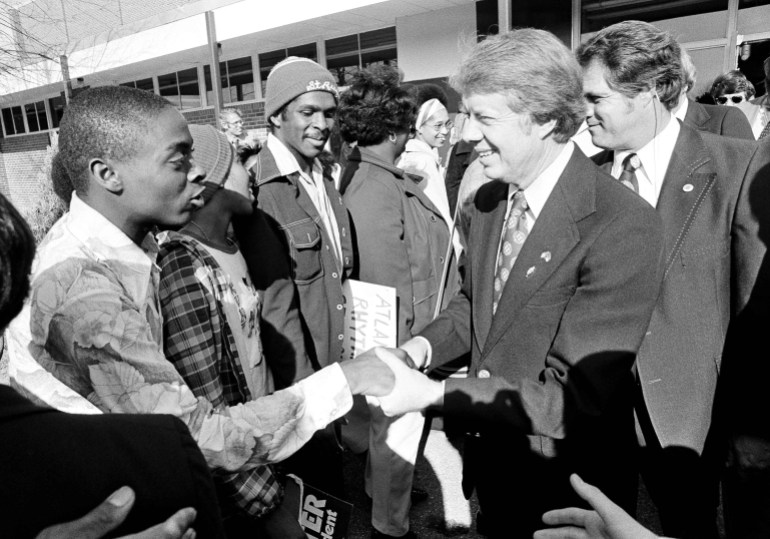
Among the maize, yam and peanut farms of Savelugu-Nanton, a remote district of northern Ghana, the legacy of Jimmy Carter is less complicated than it is back in the former US president’s homeland. Thanks to the work of his charity, The Carter Center, locals are nowadays spared the misery of Guinea worm disease – a parasite that breeds in the human belly and emerges through the skin before laying larvae in stagnant pools to await the next victim. Carter’s work in fighting the bug and tracking votes in poor countries won him a Nobel Prize for Peace in 2002. It followed a presidency that achieved a landmark Middle East peace deal, but was hamstrung by economic woes and the Iranian hostage crisis. He died on Sunday, aged 100, the Carter Center announced. He had entered hospice care in February 2023, electing to stay home after a series of short hospital stays. The former president had been diagnosed with cancer in 2015 but had responded well to treatment. At 100, he was the longest-lived president of the United States. Advertisement During six decades of politics, aid work and diplomacy, Carter “was committed to ideals like human rights, peace, and improving human life”, Steven Hochman, research director at The Carter Center, told Al Jazeera. “He didn’t just want talk, he wanted action,” Hochman said. “Whether this was through monitoring elections in Latin America or witnessing the terrible suffering from Guinea worm disease in Asia and Africa, and working to eradicate it.” [embedded content] Southern peanuts Carter grew up on the red clay soil of rural Georgia during the Great Depression. He sold boiled peanuts on the streets of Plains, his hometown, and ploughed the land with his family. His father James “Earl” Carter, was a peanut farmer and warehouseman; his mother, Lillian, was a nurse. He married Rosalynn Smith, a family friend, in 1946. The couple celebrated their 76th wedding anniversary in July 2022, a year before the former first lady died in November 2023. After a seven-year US navy career, Carter returned to his home state of Georgia, where he garnered national attention as a Democrat state governor for his prudent management, winning a spot on the cover of Time magazine as a symbol of the “New South”. Running for the presidency, Carter styled himself as an outsider to Washington politics, which were stained by the Watergate scandal and the Vietnam War. His “Peanut Brigade”, a group of friends from Georgia, crisscrossed the US and trumpeted their candidate as a straight-talking man of principle. Then-Democratic presidential candidate Jimmy Carter campaigns in Massachusetts in 1976 [File: Jeff Taylor/The Associated Press] “Carter’s election in 1976 promised to redeem the nation from the sins of Vietnam and Watergate,” Randall Balmer, a historian and author, told Al Jazeera. “He aspired to restore faith in government, but betrayal during the Lyndon Johnson and Richard Nixon years had already given way to cynicism.” Advertisement In the White House, Carter’s trademark candour did not always translate into political victories. Many of his progressive social and economic plans hit logjams in Congress; an inability to translate ideals into legislative reality sapped his popularity. The United States was mired in the stagflation woes of low economic growth, unemployment and high inflation, brought about by an energy crisis from the early 1970s. Carter’s solution, tackling US dependence on foreign oil via taxes and green energy, was quashed in the Senate. Better abroad Carter fared better overseas. He struck treaties that saw the Panama Canal brought under local control; established full diplomatic relations with China; and brokered a deal to limit nuclear weapons with Soviet leader Leonid Brezhnev. His masterwork was bringing Egyptian President Anwar Sadat and Israeli Prime Minister Menachem Begin to his presidential retreat in Camp David, Maryland, in 1978, and hammering out a peace deal between the foes over 13 tense days. “He had credibility as a peace negotiator because he listened to both sides. He could think on his feet; and speak on his feet,” said Hochman. “He was a skilled negotiator who came up with ideas for overcoming conflict and tried them out. He took chances, even if that meant he might fail.” Egyptian President Anwar Sadat, left, US President Jimmy Carter, centre, and Israeli Prime Minister Menachem meet for the first time at Camp David in 1978 [The Associated Press] The Camp David Accords led to full diplomatic and economic relations between the neighbours, on condition that Israel return the Sinai Peninsula to Egypt. They did not solve the Palestinian issue, but they have spared the region a repeat of the multi-state Arab-Israeli wars of 1948 and 1967. Advertisement “When Carter was considering the summit, and even after he announced it, just about every foreign-policy guru, Henry Kissinger included, counselled against it,” Gerald Rafshoon, the White House communications director under Carter, told Al Jazeera. “The wise men warned that a head of state should never go into a negotiation without knowing the outcome in advance. Carter rejected that advice – and did more to further the security of Israel than any US president before or since.” Middle East tumult The Middle East offered Carter a diplomatic win, but it also brought his downfall. In 1979, Iranian students stormed the US embassy in Tehran and took 52 Americans hostage – sparking a 444-day crisis that did not end until Carter had been kicked out of the White House. Carter’s efforts to secure the release of captives via the government of Ayatollah Ruhollah Khomeini were a political liability that was spotlighted nightly on US television news. A botched US rescue mission in April 1980 epitomised Carter’s misfortunes. Later that year, Americans gave the Republican presidential candidate, Ronald Reagan, a former actor and governor of California, a landslide victory over Carter. Carter’s talk of a US “crisis of spirit” and national “malaise” may have been true, but it was no vote-winner. Former President Jimmy Carter and former first lady Rosalynn Carter pose for a photo with President Joe
Why are US Republicans debating the future of H-1B high-skill work visas?
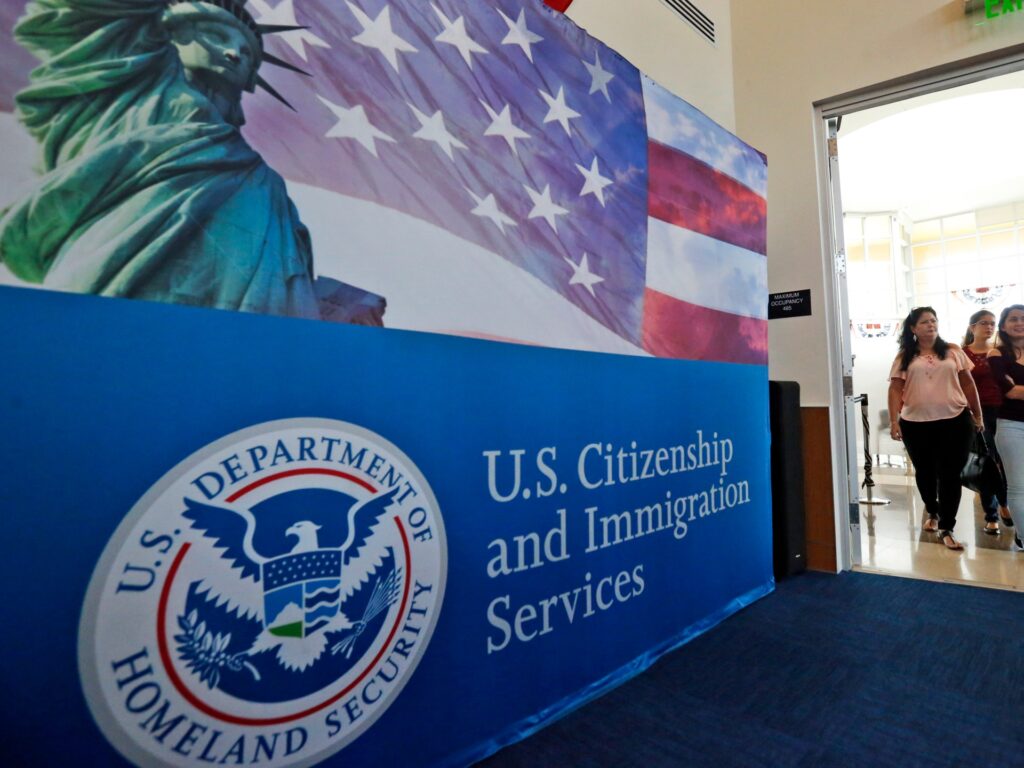
A debate over what shape hardline immigration policies will take regarding high-skilled work visas has become the first major policy dispute among prominent supporters of United States President-elect Donald Trump – just weeks ahead of the Republican’s new presidential term. On one side are members of Trump’s so-called “Make America Great Again”, or MAGA movement, who have called for a crackdown on the high-skilled H-1B visas as part of the president-elect’s wider pledge to tighten migration and immigration. Trump’s campaign pledges particularly focused on the US-Mexico border, although he has floated other restrictions. In the other camp are prominent Trump supporters – including tech billionaire Elon Musk – who have defended the visas as essential to US industrial and economic growth. Here’s what to know. How did this start? The latest debate sparked when Laura Loomer, a far-right personality who has had close ties to Trump in the past, took to social media to criticise the president-elect’s selection of an adviser on artificial intelligence, who has argued the US needs more foreign skilled workers to remain competitive in the technology industries. Advertisement The criticism from Loomer, who has been accused of racism and spreading conspiracy theories in the past, was quickly seized on by several high-profile figures in the tech industry. That included SpaceX and Tesla CEO Musk, who has been tapped by Trump to lead a government efficiency advisory board. In response, Loomer accused tech billionaires of influencing Trump for their own gains. “We have to protect President Trump from the technocrats,” Loomer said in a post on X on December 25. Who receives H-1B visas? H-1B visas are typically reserved for specialised foreign workers with a bachelor’s degree or higher who have been offered a temporary job paying an industry-standard wage in the US. The US authorities can issue 65,000 H-1B new visas a year, with a possible extra 20,000 for people with master’s degrees. The visas can also be extended upon expiration, with more than 309,000 approved for continuing employment in Fiscal Year 2022, according to US Citizenship and Immigration Services. About 70 percent of H-1B visa recipients are from India and another 10 percent are from China. What have Musk and other defenders of H-1B said? Musk has said that the “number of people who are super talented engineers AND super motivated in the USA is far too low” and has described the H-1B programme as critical “for those who want America to win”. In a series of posts on X, which he also owns, Musk further pledged to “go to war on this issue”. Vivek Ramaswamy, a former presidential candidate who has been picked to work alongside Musk on the government efficiency board, has criticised the programme as “badly broken”, but does not support removing them completely, instead saying that the visas should be granted on merit. Advertisement Ramaswamy antagonised the hardline anti-immigration faction of Trump’s supporters after he posted on social media on Thursday that tech companies hired immigrants because “American culture has venerated mediocrity over excellence for way too long”. “A culture that celebrates the prom queen over the math olympiad champ, or the jock over the valedictorian, will not produce the best engineers,” he wrote. What about Trump? Trump weighed in on the issue for the first time on Saturday. He told the New York Post: “I have many H-1B visas on my properties. I’ve been a believer in H-1B.” “I have used it many times,” he said, referring to his own real estate ventures. “It’s a great programme.” However, the statements were a departure for the president-elect. In the past, he has criticised the visas as “very bad” and “unfair” to US workers and his administration sought to increase barriers for applicants during his first term. Why does this matter? The back-and-forth underscores a growing fault line between many of the earliest supporters of Trump and those like Musk who only embraced him in the 2024 election campaign. Many of the latter – like Musk – are associated with the tech industry, and are less prone to amplifying nativist rhetoric. The infighting could inform the next four years of Trump’s presidency, with Musk already warning of a “MAGA civil war” over the issue. Several of Trump’s most prominent supporters during his first term have joined in, with strategist Steve Bannon condemning “Big Tech oligarchs” who support the visas. Advertisement Adblock test (Why?)
Trump, Biden react to death of former President Jimmy Carter
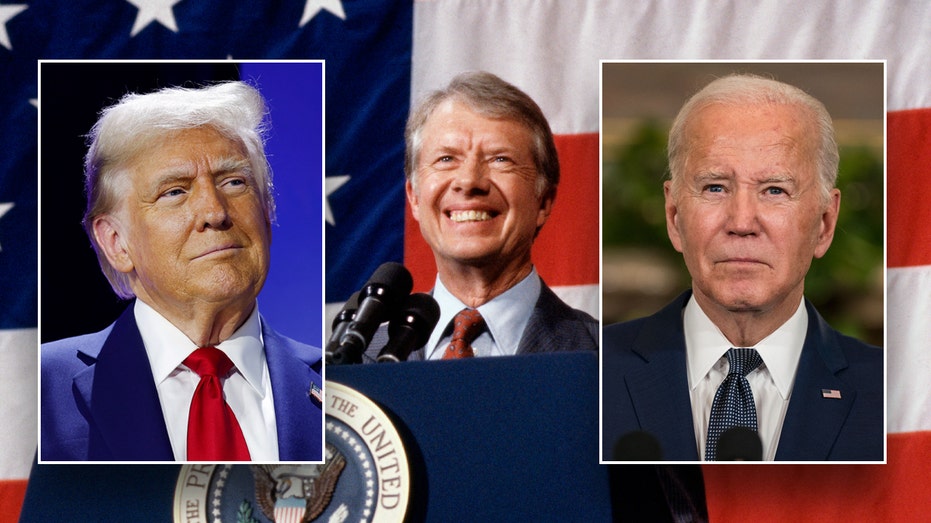
President-elect Trump and President Biden reacted to the death of former President Jimmy Carter on Sunday, with Trump saying, “we all owe him a debt of gratitude,” and Biden honoring his “dear friend.” Carter, who was the 39th president of the United States and a peanut farmer whose vision of a “competent and compassionate” government propelled him into the White House, died at his home in Plains, Georgia, on Sunday at the age of 100. “I just heard of the news about the passing of President Jimmy Carter. Those of us who have been fortunate to have served as President understand this is a very exclusive club, and only we can relate to the enormous responsibility of leading the Greatest Nation in History,” Trump wrote on Truth Social. “The challenges Jimmy faced as President came at a pivotal time for our country and he did everything in his power to improve the lives of all Americans. For that, we all owe him a debt of gratitude. “Melania and I are thinking warmly of the Carter Family and their loved ones during this difficult time. We urge everyone to keep them in their hearts and prayers,” the incoming president added. JIMMY CARTER, 39TH PRESIDENT OF THE UNITED STATES, DEAD AT 100 Also weighing in was President Biden, who said, “the world lost an extraordinary leader, statesman, and humanitarian.” “Over six decades, we had the honor of calling Jimmy Carter a dear friend. But, what’s extraordinary about Jimmy Carter, though, is that millions of people throughout America and the world who never met him thought of him as a dear friend as well,” Biden wrote. “With his compassion and moral clarity, he worked to eradicate disease, forge peace, advance civil rights and human rights, promote free and fair elections, house the homeless, and always advocate for the least among us. He saved, lifted, and changed the lives of people all across the globe.” Biden referred to Carter as a man of great character and courage, hope and optimism. FORMER PRESIDENT JIMMY CARTER TO SPEND ‘REMAINING TIME’ AT HOME RECEIVING HOSPICE CARE He also said he and his wife will cherish seeing Carter and his wife, Rosalynn, together, noting that the love between the two is the “definition of partnership,” while their leadership is the definition of “patriotism.” “We will miss them both dearly, but take solace knowing they are reunited once again and will remain forever in our hearts,” Biden said. “To the entire Carter family, we send our gratitude for sharing them with America and the world. To their staff – from the earliest days to the final ones – we have no doubt that you will continue to do the good works that carry on their legacy. “And to all of the young people in this nation and for anyone in search of what it means to live a life of purpose and meaning – the good life – study Jimmy Carter, a man of principle, faith, and humility. He showed that we are great nation because we are a good people – decent and honorable, courageous and compassionate, humble and strong,” Biden added.
Texans remember Jimmy Carter, the last Democrat to take the state’s presidential election
The Georgia peanut farmer turned politician won Texas’ 26 electoral votes in 1976 but couldn’t repeat the feat four years later against Ronald Reagan.
Tributes pour in from Congressional lawmakers after Jimmy Carter’s death: ‘A great humanitarian’
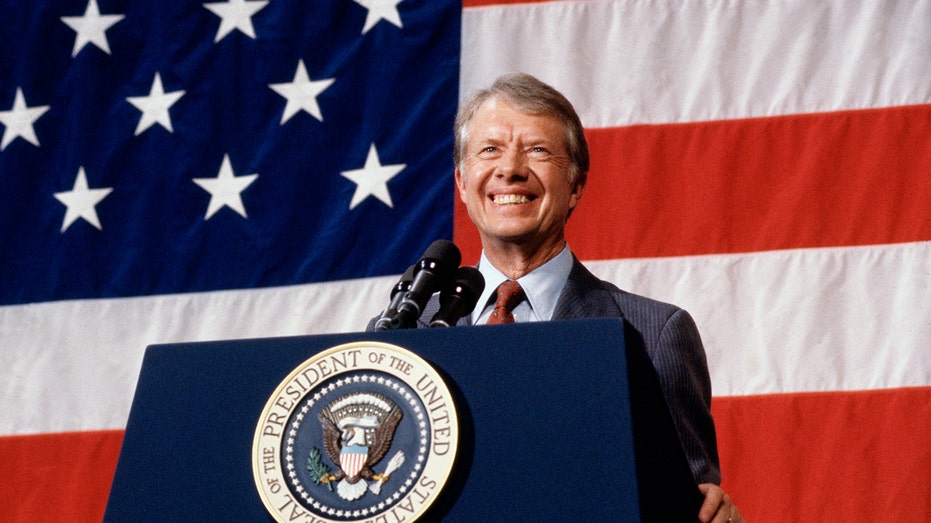
Members of Congress on both sides of the aisle have shown an outpouring of sympathy in the wake of former President Jimmy Carter’s death on Sunday. “I join all Americans in saluting President Carter for his lifetime of service, first as a naval officer, then as a senator in the Georgia legislature, then as Governor of Georgia, and, finally, as President of the United States,” House Majority Leader Steve Scalise, R-La., said in a statement on Sunday. “Jennifer and I would like to extend our heartfelt condolences to the Carter family.” Senate Majority Leader Chuck Schumer, D-N.Y., said in a statement, “Today, we mourn the loss of one of our most humble and devoted public servants, President Jimmy Carter.” REPUBLICANS GIVE DETAILS FROM CLOSED-DOOR MEETINGS WITH DOGE’S MUSK, RAMASWAMY “From his legacy as President, to his dedication to improving human rights across the globe, and his tireless efforts alongside his wife, Rosalynn, in building a better world through Habitat for Humanity, he inspired millions with his unwavering commitment to justice and equality,” Schumer said. “President Carter’s faith in the American people and his belief in the power of kindness and humility leave a strong legacy. He taught us that the strength of a leader lies not in rhetoric but in action, not in personal gain but in service to others.” Carter died on Sunday afternoon at age 100, his nonprofit foundation, The Carter Center, announced. Both Republicans and Democrats immediately sent condolences to his family and praised his lifetime of service, particularly after his one-term stint in the White House. House Minority Leader Hakeem Jeffries, D-N.Y., said on X, “Thankful for the incredible life, legacy and leadership of President Jimmy Carter. He was a great man, a great role model and a great humanitarian.” FORMER PRESIDENT JIMMY CARTER TO SPEND ‘REMAINING TIME’ AT HOME RECEIVING HOSPICE CARE “Today, I join Americans across the country in mourning the loss of our 39th President, Jimmy Carter,” said Rep. Mike Collins, R-Ga., who hails from Carter’s home state of Georgia. “Born in a small town in Georgia, President Carter’s dedication to public service, leadership, humanitarian work, and Christian spirit touched the lives of countless individuals.” Rep. Hank Johnson, a Peach State Democrat, said, “President Carter restored honest competence, integrity, and humility to the Office of the Presidency.” “He led the nation with vision and courage, although his Southern heritage was used to belittle him in the eyes of many,” Johnson said in a statement. “I know of no man in his post presidency who has had a greater impact on humanity than President Carter. A member of Georgia’s Congressional delegation on the other side of the aisle, Rep. Austin Scott, R-Ga., said the U.S. “lost a great Georgian” on Sunday. “President Jimmy Carter was a distinguished public servant, a proud farmer, an accomplished Navy veteran, and a graduate of the US Naval Academy,” Scott said. “Even after leaving the White House, President Carter maintained his efforts to serve those in need…His legacy lives on as the namesake of USS Jimmy Carter (SSN-23).”
Jimmy Carter: His life in pictures
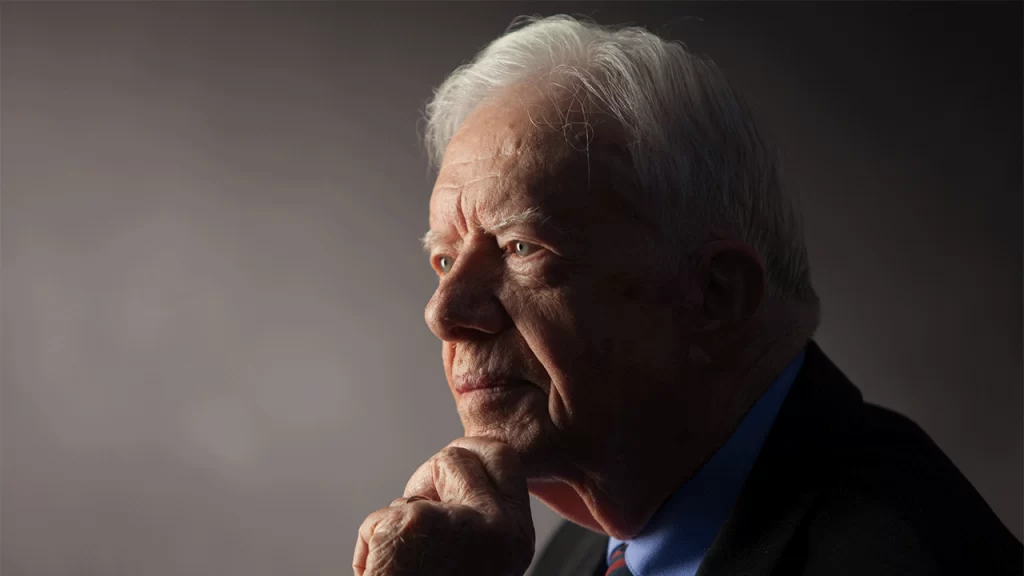
Jimmy Carter served as the 39th President of the United States. Known for his Christian faith, Carter lived a life of service that left a forever mark on United States history.
Camp David: Jimmy Carter’s finest moment
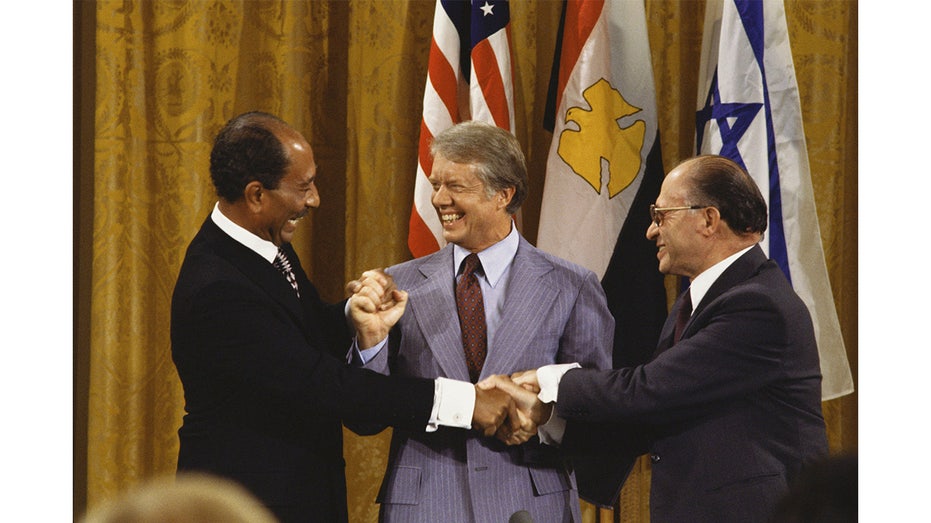
One of Former President Jimmy Carter‘s defining moments was being the president who managed to broker the first peace agreement in the Middle East, successfully ushering in peace between Israel and Egypt after 30 years of war. With the Camp David Accords of 1978, Carter was able to stand out from his predecessors by notching a success in an area where they had failed. The feat became particularly notable amid a presidency known for various economic and foreign affairs shortcomings. According to Martin Indyk, the Lowy distinguished fellow in U.S.-Middle East diplomacy at the Council on Foreign Relations, “Arab-Israeli peace has always been the kind of Holy Grail for American diplomacy.” PRESIDENT CARTER LAUDED FOR POST WHITE HOUSE SERVICE “There have been other agreements, but none of them so important, as the peace treaty that Jimmy Carter brokered between Israel and Egypt. It was the first, and it was the most important,” Indyk, who was once special envoy for Israeli-Palestinian negotiations under former President Obama, continued. The Camp David Accords were signed by then-President Carter, Egyptian President Anwar Sadat and Israeli Prime Minister Menachem Begin in September 1978, and signaled peace between the two countries. Egypt was considered the largest and most powerful Arab nation at the time. Negotiations had begun years earlier, in 1973, and were led by former Secretary of State Henry Kissinger. The start of discussions was prompted by the Yom Kippur War, which had proven an expensive conflict for both Israel and Egypt, as well as the Arab countries it led. Kissinger had managed to negotiate a ceasefire and disengagement pact, leading to Isreal withdrawing a third of its military forces from the Sinai Peninsula. Carter first sought to finalize a deal in November 1977, when Sadat historically traveled to Jerusalem and gave remarks on his desire for peace between the countries. SECRET SERVICE SPOKESMAN ON JIMMY CARTER’S HEALTH: ‘FOREVER BY YOUR SIDE’ Indyk described those inital talks very difficult and noted they were ultimately unsuccessful. “So you had this… moment of great hope created by Sadat’s initiative, to go into the enemy’s den as it were, into Jerusalem and to speak of peace. But that proved very difficult to achieve agreement,” he said. “And that’s when Carter took the risky decision to bring both leaders to Camp David to try to broker a peace agreement between them.” The high-risk meeting with both leaders at Camp David was confidential and lasted 12 days. “They had no certainty at all that they would be able to bridge the gaps,” Indyk said of the meeting’s sensitive nature. Carter faced an important question during the meeting: What would happen to the Palestinian people? “The Palestinian cause was a national cause for the Arabs and so Sadat felt he could not simply abandon them. That he had to have some understanding about what would happen for the Palestinians once he made peace with Israel,” Indyk explained. Indyk attributed Carter’s decision to focus solely on Israel and Egypt to the former president’s “genius.” JIMMY CARTER HAD ONE OF THE ‘GREATEST SECOND ACTS’ IN AMERICAN HISTORY, CONSERVATIVE HISTORIAN SAYS “They had a kind of loose framework for what would happen on the Palestinian front, but essentially, the deal that he did, that he persuaded president Sadat of Egypt to do, was a standalone peace treaty between Israel and Egypt. That’s what he succeeded in negotiating that Camp David,” he said. But this result was contrary to what aides for Carter and Sadat both had advised, per Indyk. “This was Carter’s decision. Against the advice of his advisers and against the advice of Sadat’s advisers, it was his decision to go for the separate peace between Israel and Egypt.” The agreement with Sadat went on to become a foreign policy hallmark of Carter’s presidency and also earned him the Nobel Peace Prize in 2002. “He was an embattled president,” Indyk said. “Nothing else was really going well for him. There were other things he achieved, but this was the most important one.”
Jimmy Carter’s presidency: A time of ‘malaise’ that led to the election of Ronald Reagan
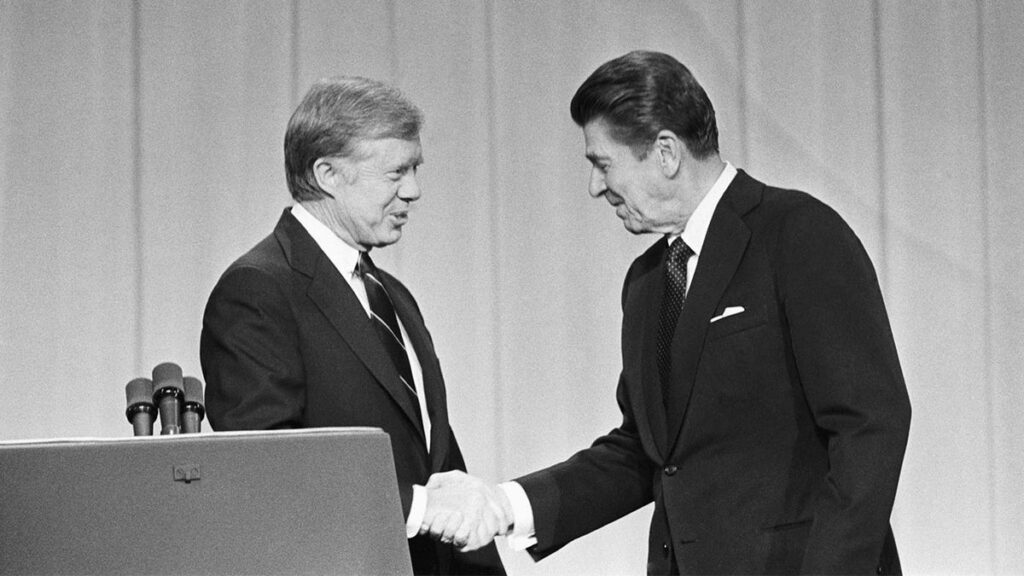
In his one term in the White House, the late President Jimmy Carter struck the Camp David Accords between Israel and Egypt, helped take the world further from nuclear proliferation with the second Strategic Arms Limitation Treaty (SALT), signed the Panama Canal Treaties, which ended a century of direct American control over the crucial canal, and deregulated the nation’s airline industry. But Carter, a former Georgia governor who defeated Republican President Gerald Ford in the 1976 election, also confronted the socialist Nicaraguan revolution in Central America and the invasion of Afghanistan by the Soviet Union, which led to a resumption of Cold War tensions with Moscow and an embargo of the 1980 Summer Olympics by the U.S. And domestically, the one-term Democratic president battled massive inflation known as stagflation, and an energy crisis that led to the return of gas lines across the country. As Carter struggled to cope with multiple domestic and international crises, the then-president went on national television in July 1979 to deliver what was titled “the crisis confidence” address, but was later dubbed the “malaise” speech, even though the world malaise never appeared in Carter’s actual address. Carter called for Americans to return to a sense of civic duty that would unify the country through a call for shared sacrifice for the common good of the nation. While initially giving the president a boost in the polls, the goodwill was short-lived. A couple of days after the address, Carter fired several members of his cabinet and was unable going forward to be seen as a strong and effective leader. REACTIONS POUR IN AS JIMMY CARTER ENTERS HOSPICE Adding to Carter’s woes, was the overrunning of the American embassy in Tehran in the late autumn of 1979, which triggered the more than yearlong Iranian hostage crisis. Carter, politically weakened by a fierce and nearly successful primary challenge by the late Sen. Edward Kennedy of Massachusetts for the 1980 Democratic presidential nomination, was crushed by GOP nominee Ronald Reagan in the general election, with the former California governor sweeping 44 of the 50 states. Historian and author Craig Shirley, who wrote multiple books about Reagan and Carter, pointed to the economic conditions at the time as a major contributor to Carter’s demise. “Interest rates were something like 18%. Inflation was almost as high. The value of a dollar wasn’t worth today what it was yesterday. It was really devastating to people’s savings,” Shirley spotlighted in a C-SPAN interview a few years ago. FORMER PRESIDENT JIMMY CARTER TO SPEND ‘REMAINING TIME’ AT HOME RECEIVING HOSPICE CARE Veteran political scientist Wayne Lesperance, president of New England College, concurred. “While it is certainly true that the Carter Administration had its share of successes, such as the Camp David Accords and the Panama Canal Treaty, in the months leading up to the 1980 election, voters were focused on high inflation, low economic growth, an energy crisis and the growing perception that American power and influence in the world was in decline,” Lesperance said. “The Iran hostage crisis and failed rescue attempt punctuated the feeling that the U.S. under Carter had become a paper tiger. Americans wanted John Wayne. They elected Ronald Reagan whose campaign projected strength, confidence, humor, and a nostalgic appeal to an America as the proverbial shining city on a hill,” he emphasized. But it’s the “malaise” speech that still stands out more than four decades after Carter’s stinging rejection by American voters. “Jimmy Carter’s one-term presidency would be known for many things: stagflation, a terrible economy, weakness in the face of Soviet advances, but also the Camp David Accords and ushering in the Age of Reagan. Yet to his everlasting chagrin, Carter’s failed four years in office will always be reduced to the word “malaise,” and his awful, terrible, embarrassing speech in July of 1979,” Shirley wrote on the 40-year anniversary of the infamous address.
Jimmy Carter, 39th president, remembered for his integrity and devotion to humanity
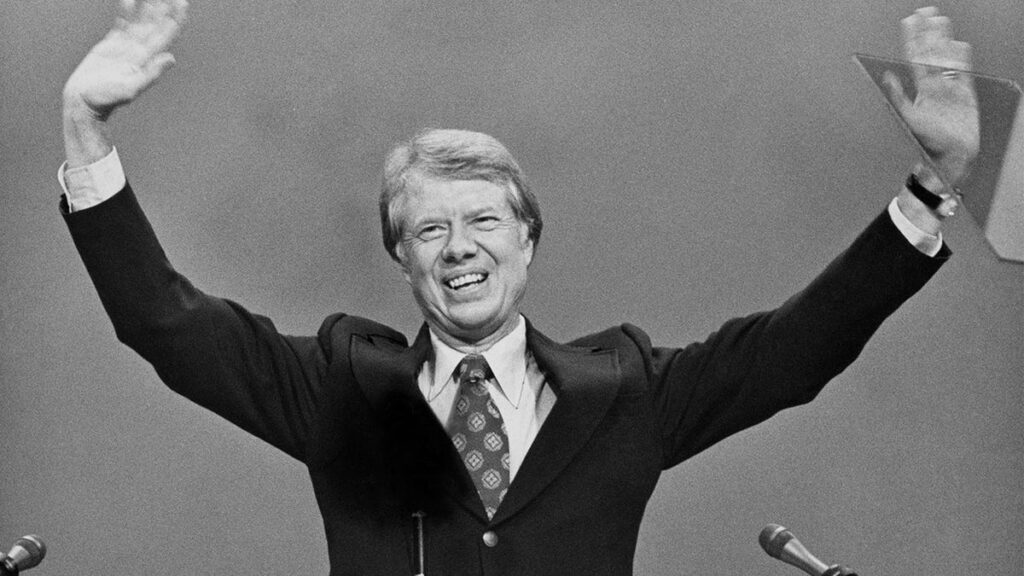
Jimmy Carter, the nation’s 39th president, has died at the age of 100. He served a single term as president, but he also will be remembered for his decades of humanitarian work. Those who knew him – opponents and supporters alike – described him as a man of integrity, whatever flaws he may have had as president. “When we look at the whole thrust of Jimmy Carter’s life, it’s an amazing American story,” Douglas Brinkley, author of The Unfinished Presidency: Jimmy Carter’s Journey Beyond the White House, told Fox News Digital. “He grew up with no electricity, went to work in the… Navy. He became President of the United States at the height of the Cold War and won the Nobel Prize for his post-presidency,” Brinkley said. “All the time, his ambitious humanity was aimed at trying to make sure that everybody he came in contact with, had a better, fair shake at life.” JIMMY CARTER HAD ONE OF THE ‘GREATEST SECOND ACTS’ IN AMERICAN HISTORY, CONSERVATIVE HISTORIAN SAYS A peanut farmer and former one-term governor of Georgia, Carter beat the odds and was elected president in 1977. “Nobody thought Carter could procure the Democratic nomination. But Carter had a unique amount of bulldog tenacity [and] gumshoe perseverance,” Brinkley said. His campaign befuddled Democrats, as Carter was deeply religious and ran to the right of his Republican opponent, Gerald Ford, on some social issues. As a Washington outsider, Carter’s agricultural background and accent endeared him to the deep south. He took office at a time when Watergate, the Vietnam War, and stagflation had left the country in a sour mood. In Washington, his populist campaign inevitably collided with establishment Democrats who never fully accepted Carter. TIM SCOTT’S MASSIVE WAR CHEST COULD GIVE HIM HEAD START IN 2024 PRESIDENTIAL CAMPAIGN “He never had a full grip on his own Democratic Party. Ted Kennedy liberals didn’t like Carter, and the Scoop Jackson Cold War hawks didn’t like him,” Brinkley said. “So, he was kind of an island unto himself as president.” Carter’s foreign policy wins included brokering Mideast peace by keeping Egyptian President Anwar Sadat and Israeli Prime Minister Menachem Begin at the bargaining table for nearly two weeks in 1978. At home, Carter partially deregulated the airline, railroad, and trucking industries and established the departments of Education and Energy and the Federal Emergency Manager Agency. Carter designated millions of acres in Alaska as national parks or wildlife refuges and he appointed a then-record number of women and non-whites to federal posts. He also built on Nixon’s opening with China and pushed Latin America from dictatorships to democracy. Yet, his president was also marked by double-digit inflation, long gasoline lines, and the 444-day hostage crisis in Iran. His bleakest hour came when eight Americans died in a failed hostage rescue in April 1980, helping to ensure his landslide defeat. Carter was also crippled by his – as Brinkley put it – “lack of communication chops.” Oratory, Brinkley said, was not his strong suit. In 1979, Carter delivered his famous “Crisis of Confidence” speech in which he lamented that the United States, once a nation “proud of hard work, strong families, close-knit communities, and our faith in God” had descended into “self-indulgence and consumption.” SIX DEMOCRATS WHO COULD RETIRE AHEAD OF A POSSIBLY GRUELING 2024 SENATE ELECTION CYCLE “Human identity is no longer defined by what one does, but by what one owns. But we’ve discovered that owning things and consuming things does not satisfy our longing for meaning,” Carter said. “We’ve learned that piling up material goods cannot fill the emptiness of lives which have no confidence or purpose.” Craig Shirley, a Reagan biographer and historian, recalled watching the speech while working for a senator on Capitol Hill. “I remember watching it that Sunday night and feeling for the first time in my life, I felt scared as an American. The speech was such a downer. It was so depressing,” Shirley said. “A president is supposed to tell the truth to the American people, but also appeal to the American people’s hopes and aspirations and not their worst feelings or desires.” Carter ultimately served a single, tumultuous term and was defeated by Republican Ronald Reagan in 1980. But whatever flaws his presidency may have had, Carter will perhaps be most fondly remembered for the decades he spent post-presidency advocating for democracy, public health, and human rights via The Carter Center. CHRISTIAN GROUP URGES BIDEN TO PREVENT ‘GENOCIDE’ DEVELOPING ON RUSSIA’S DOORSTEP The Center, which Carter opened with his wife, Rosalynn, in 1982, has been a pioneer of election observation, monitoring at least 113 elections in Africa, Latin America, and Asia since 1989. In perhaps its most widely hailed public health effort, the organization recently announced that only 14 human cases of Guinea worm disease were reported in all of 2021, the result of years of public health campaigns to improve access to safe drinking water in Africa. Carter’s work with the Center garnered a Nobel Peace Prize in 2002. For his humanitarian work, Shirley argued, Carter will be remembered as “one of the best ex-presidents of the 20th century.” “Carter really wasn’t for PR stunts. He really threw himself into his charitable works and did so for many years,” Shirley said. “We’re going to remember him kindly. He was a terrific former president with what he did with the Carter Center and the various initiatives around the country. His book writing stands out [as does] his charitable works. So, he goes down in his history as an extraordinarily good, former president.” The Associated Press contributed to this report.
Jimmy Carter, 39th president of the United States, dead at 100
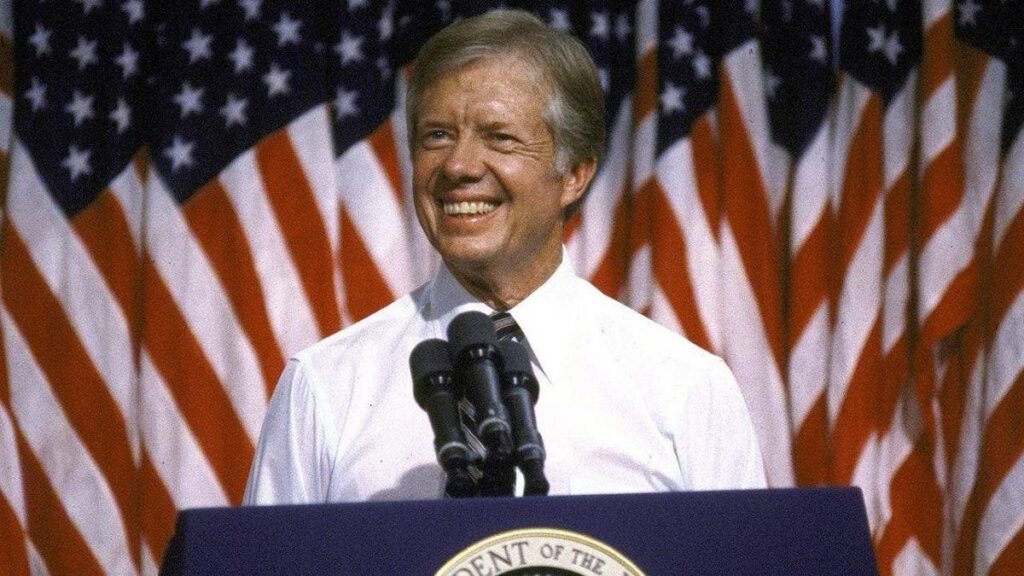
Jimmy Carter, the 39th president of the United States and a former peanut farmer whose vision of a “competent and compassionate” government propelled him into the White House, died on Sunday, according to local media. He was 100. The news was announced by the Atlanta Journal-Constitution on Sunday. Carter’s death follows the passing of his wife Rosalynn on Nov. 19, 2023 at the age of 96 with her family by her side at the Carter home in Plains, Georgia, just days after she had been admitted to hospice care. The late former president himself had entered hospice care in February 2023. Carter survived for years after he had a “small mass” removed from his liver in early August 2015 and later that month announced he had liver cancer that had spread throughout his body. The Carter family had a history of cancer and the former president lost his father, brother, and two sisters to pancreatic cancer. His mother had breast cancer, which later spread to her pancreas. FORMER PRESIDENT JIMMY CARTER TO SPEND ‘REMAINING TIME’ AT HOME RECEIVING HOSPICE CARE Jason Carter, Carter’s grandson, had announced in May that he believed the former president was “coming to the end” of his life’s journey. But the former president hung on much longer. The soft-spoken leader with a signature Georgia drawl saw his single term in the Oval Office clouded by an economic downturn at home and a hostage crisis abroad. His post-presidency life was marked by a very visible dedication to service, but also a series of sometimes controversial moves as he continued to wade into foreign affairs, particularly as it related to the Israeli-Palestinian conflict. Carter met with the leadership of terrorist group and Palestinian representative Hamas in 2009 and 2015. He reprimanded Israel for its operations against Hamas in 2014, saying there was “no justification in the world for what Israel is doing.” James Earl Carter Jr. was born in 1924 in Plains, Georgia. Plains was a farming town and Carter’s father was a farmer, a background that helped instill in him a love of the land – and the working and lower class people who tilled it – that would follow him throughout his personal and professional life. But Carter initially sought a path outside the dirt of Plains and, after attending the U.S. Naval Academy, he served as a submariner in the post-World War II navy, eventually attaining the rank of lieutenant. Carter married Rosalynn Smith, a fellow native of Plains, in 1946, the same year he graduated from the Academy. After Carter’s father died in 1953, Carter resigned his naval commission and returned to his and Rosalynn’s roots in Plains. Carter took the lead at the family farm while Rosalynn operated a farm supply company in their small Georgia town. It wasn’t long, however, before Carter again left the farm fields behind, this time beginning a career in politics that would land him the nation’s highest office in just 14 years. Carter won election to the Georgia Senate in 1962 and, following a failed gubernatorial bid in 1966, he became the state’s governor in 1971. JIMMY CARTER CELEBRATES 98TH BIRTHDAY WITH FAMILY, FRIENDS, BASEBALL Carter grew into a national Democratic Party leader and won the 1976 presidential election against President Gerald Ford, riding a wave of popular discontent with former President Richard Nixon – and the pardon that Ford had extended to Nixon. While in the White House, Carter established full diplomatic relations with China and led negotiation of a nuclear limitation treaty with the Soviet Union. Domestically, he led several conservation efforts, showing the same love of nature as president as he did as a young farmer in Plains. He has cited the Panama Canal treaties and the Camp David accords that brought peace between Egypt and Israel as among his greatest personal accomplishments. “We focused on peace,” he told The Washington Post in 2014. “We never shot a bullet or dropped a bomb on anyone.” But peace wasn’t always easily maintained, and a perceived lack of strength in dealing with bad actors likely contributed to his lopsided 1980 defeat by Ronald Reagan. The final 14 months of his presidency were dominated by the Iran hostage crisis. Following the country’s revolution, the new government took 52 American hostages. Carter was never able to retrieve the detained Americans or negotiate for their release. In an obvious snub, Iran finally released the 52 after they had been held for 444 days — on the same day Carter left office. And though Carter started the Department of Education and the Department of Energy, two government bureaucracies that have since become popular targets for Republicans, a nationwide energy crunch also served to hurt his tenure. Footage of gas lines and high gas prices are a seminal feature of nearly any late 1970s documentary or discussion. The domestic and foreign issues led Sen. Ted Kennedy to take the rare step of challenging Carter for the Democratic presidential nomination. Though Carter survived that battle, though barely, he wasn’t as fortunate in November 1980, when Reagan won 44 states and the presidency. JIMMY CARTER, WIFE ROSALYNN CELEBRATE 75 YEARS OF MARRIAGE Upon leaving the White House, Carter, who authored 28 books, was named a distinguished professor at Emory University in Atlanta and founded The Carter Center, a nonprofit organization focusing on national and international public policy. Carter told The Associated Press that he had the “best times” of his life after establishing the organization in 1982. “This beautiful place on Earth that has set moral and ethical standards that exemplify what a superpower like America ought to be,” Carter said of the center in October. Recalling the manual labor of his youth in Plains, Carter was often seen volunteering and fundraising for Habitat for Humanity, helping to build homes for the needy. Carter also served as a member of The Elders, a group of independent global leaders no longer in politics whose ranks at one time included South Africa President Nelson

